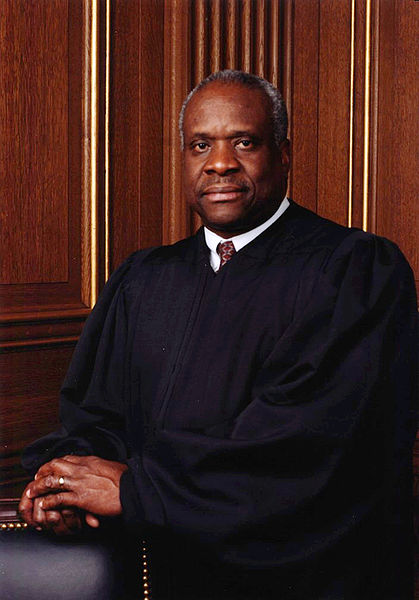Justice Thomas' Corrupt Record Should Inspire New Code Of Ethics

Starting from the beginning, Thomas' nomination was woven with scandal. Thomas' former coworker, Anita Hill, complained of sexual harassment in the workplace, supported by statements from Angela Wright and Sukari Hardnett. Coincidentally, Thomas urged a hasty start to his term as Supreme Court Justice, and as soon as his term began, news coverage regarding his personal life weakened due to his new political influence. Thomas argued that he wanted issues in his personal life to be kept private, interestingly contradicting his voting record as Supreme Court Justice, which demonstrates his lack of regard for Americans’ right to privacy.
Furthermore, nearly 20 years after Hill accused Clarence of sexual harassment during his contentious Supreme Court confirmation hearings, the justice’s second wife, Virginia Thomas, called Ms. Hill seeking forgiveness. The nagging apology from Virginia Thomas appears not as an effort to seek amends, but rather as a confidence boost, since the call was widely publicized and again, not in line with her husband's supposed views on privacy.
Unfortunately, Thomas' unsavory record does not stop there. He worked as a lawyer for the infamous Monsanto for four years, and as a Supreme Court judge has voted in their favor every time. This conflict of interest should have caused Thomas to recuse himself from the court cases in question, or he at least should have provided the public with a statement explaining why he felt there was no such conflict.
Then, Thomas attended a political retreat, multiple dinners and secretive political strategy sessions hosted by Koch Industries and the Koch brothers. Referring to a 2008 retreat, Justice Thomas asserted that he only “dropped by.” Newsflash: staying at a political event for four days is not "dropping by." As if it would disguise this conflict of interest, Thomas claimed that he was paid by the Federalist Society to attend the events, not by the Koch brothers. The Koch brothers are key donors to the Federalist Society. Thus, the Koch brothers indirectly paid Thomas and provided him with plausible deniability. Justice Thomas’s ensuing ruling in the Citizens United campaign finance case, publically supported by only 20 percent of Americans, benefited the Koch brothers' political activities, and, as the nonpartisan, not-for-profit organization Common Cause stated, the Citizens United ruling directly benefited Koch Industries. The ruling solidified corporate personhood and ballooned the amount of money corporations could donate to political campaigns, thereby increasing the Koch brothers' influence in Washington.
Next, in 2010, Virginia Thomas created the Tea Party-affiliated organization called Liberty Central. The group opposed President Obama's healthcare overhaul. As part of her position in the organization, Thomas accepted more donations allowed under the new campaign finance rules loosened by her husband and the Supreme Court. As husband and wife, Virginia and Clarence most likely share funds. Thus, the conflict of interest surfaces as Virginia’s tax-exempt, nonprofit organization receives substantial contributions from companies or trade associations that have interests in matters that are pending at the Supreme Court or are headed there, such as healthcare regulation. Although Virginia Thomas stepped down as head of the organization to lessen her influence in the organization, Justice Thomas did not recuse himself from the Supreme Court case regarding healthcare even when 74 House Democrats wrote a letter asking him to.
Then, Common Cause uncovered that Virginia Thomas earned over $680,000 from the conservative think tank, Heritage Foundation, from 2003 to 2007. Justice Thomas failed to include it on his financial disclosure forms. Instead, he continually reported a lack of spousal income. Once he was caught, Thomas amended 13 years’ worth of disclosure reports to include details of his wife's income. He wrote in explanation that it was a “misunderstanding of the filing instructions.” As a Supreme Court Justice, the public can logically assume that Thomas knows how to obey the law by correctly filling out a disclosure report. Evidently, he was aware that there was a spot to include his wife’s income because he checked “none.” He can't claim that he simply didn't know about her income, either, because when his wife was making $680,000, the increase in the Thomases joint bank account should have been obvious, especially to a Supreme Court Justice. Furthermore, the Heritage Foundation receives funding from the Koch Brothers, providing another financial link between the Thomases and the Koches by the time of the 2009-10 Citizens United decision.
Finally, in a most recent case of questionable ethics, a close friend of Thomas who once gave Virginia Thomas $500,000 for Liberty Central, Harlan Crowe, is financing a multimillion-dollar restoration of a Georgia cannery where Clarence’s mother worked at the Clarence’s bidding. Yet, the ethics code that binds federal judges states that judges “should not personally participate” in raising money for charitable endeavors, out of fear that benefactors might feel entitled to receive favorable treatment from the judge. Furthermore, judges are not supposed to know who donates to projects honoring them.
Supreme Court justices technically are not subject to the federal code of ethics, but others of the justices have said that they obey it anyway. And although not legally subjected to the U.S. Code of Judicial Conduct, Thomas is subject to the constitutional requirement that Supreme Court Justices serve only on terms of “good behavior.” Thomas' track record demonstrates that he has done the opposite. Clarence Thomas’ shady dealings as Supreme Court Justice should not only lead to his retirement, but they should also inspire support for a code of ethics specifically for the Supreme Court. The Supreme Court Ethics Act of 2013, recently introduced in Congress, hopes to address this concern and thereby strengthen Americans' trust in the Supreme Court.
Reach Contributor Kevin Cheberenchick here.



